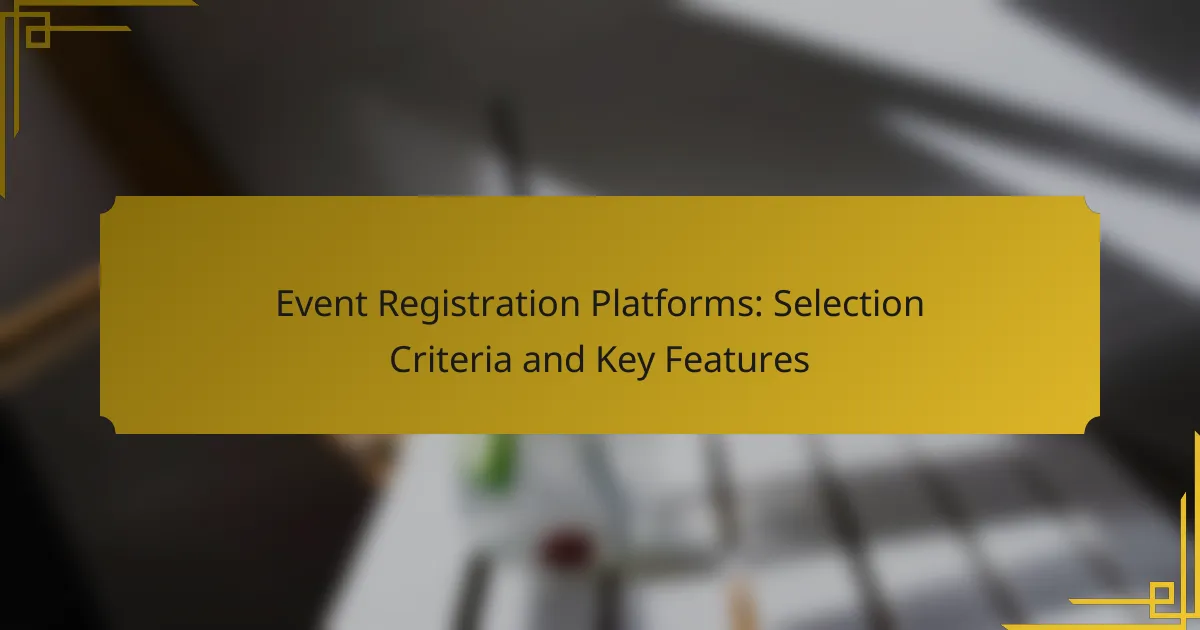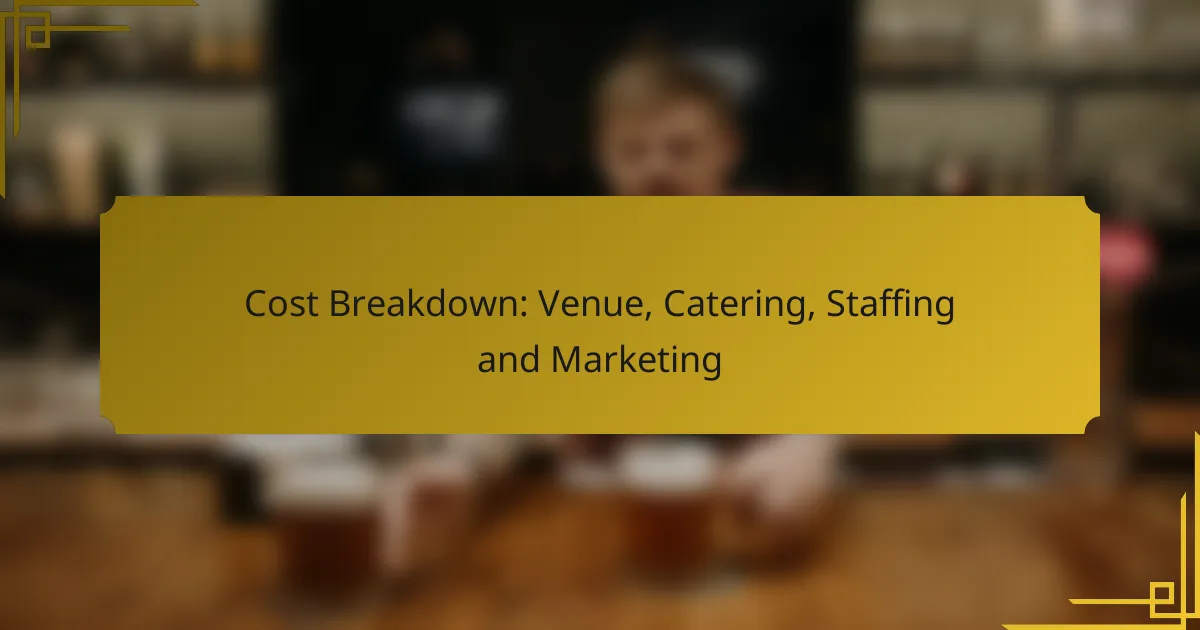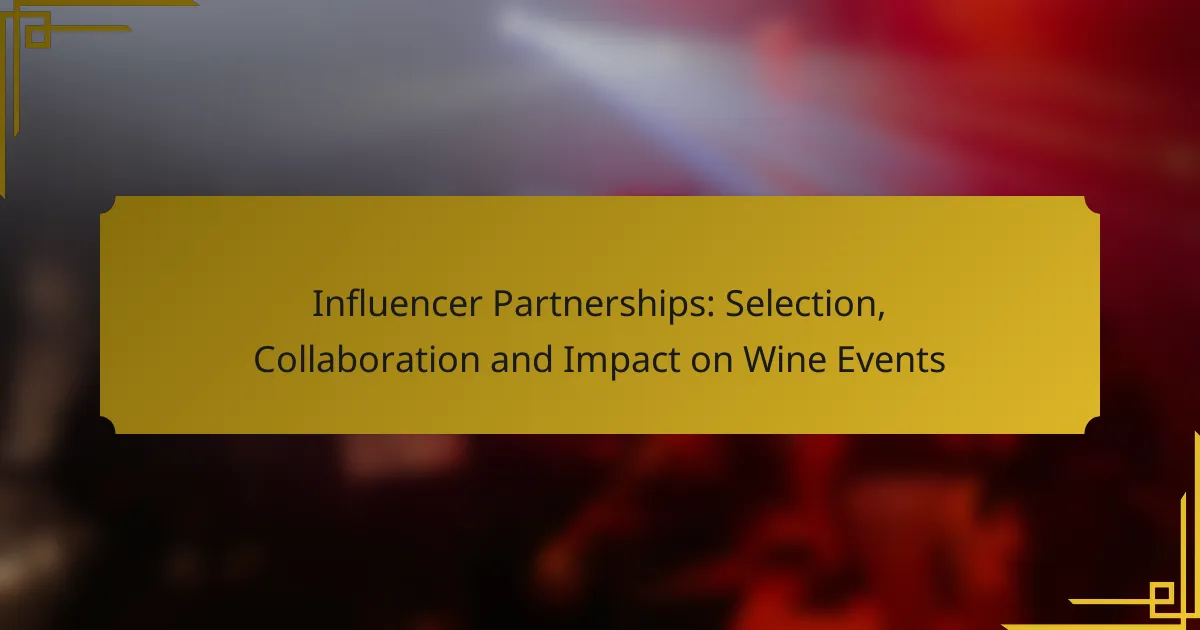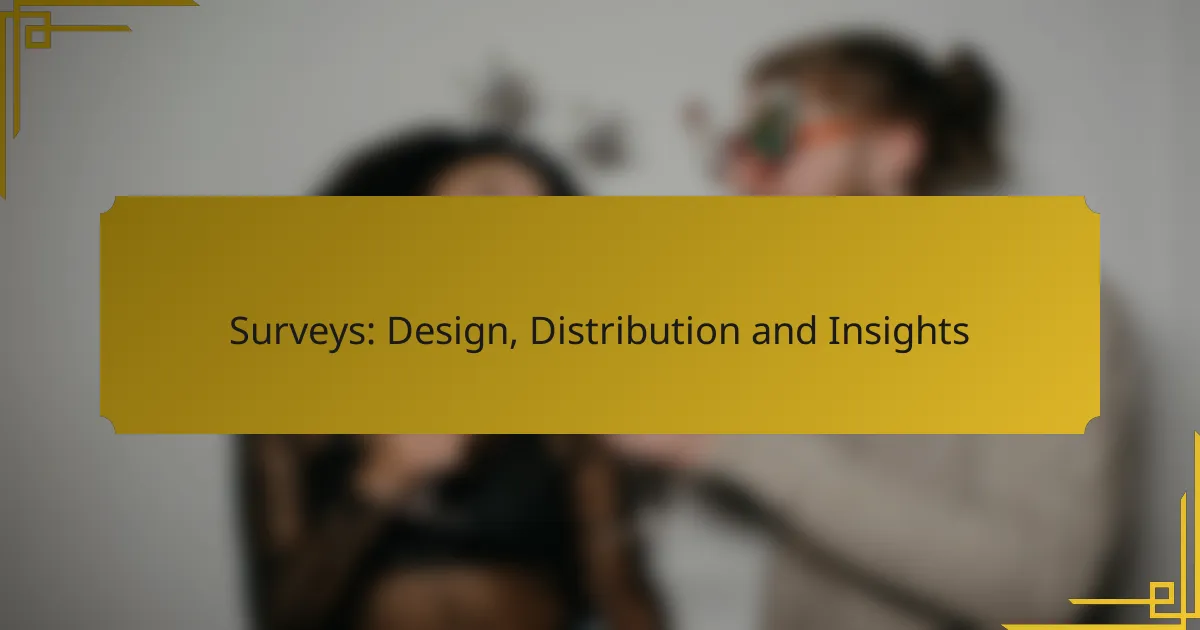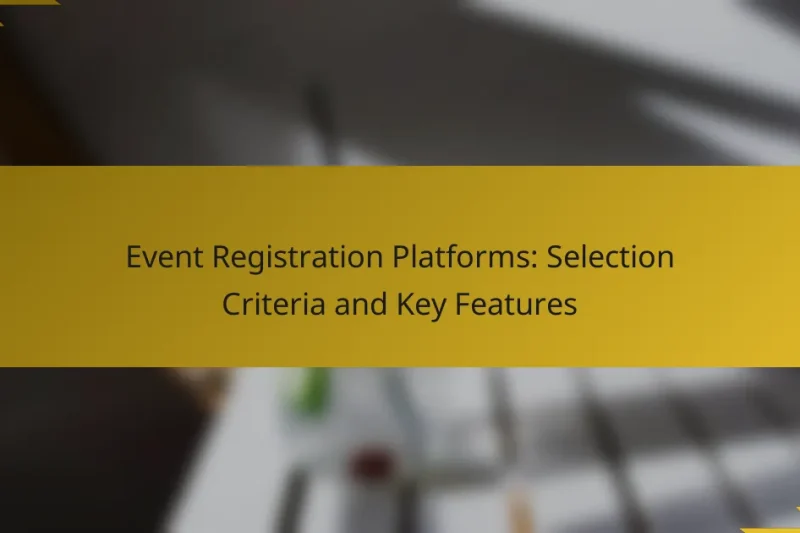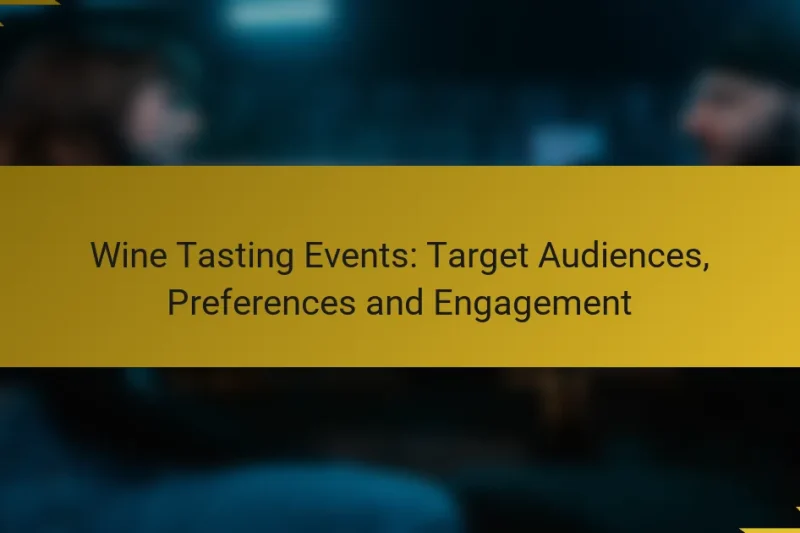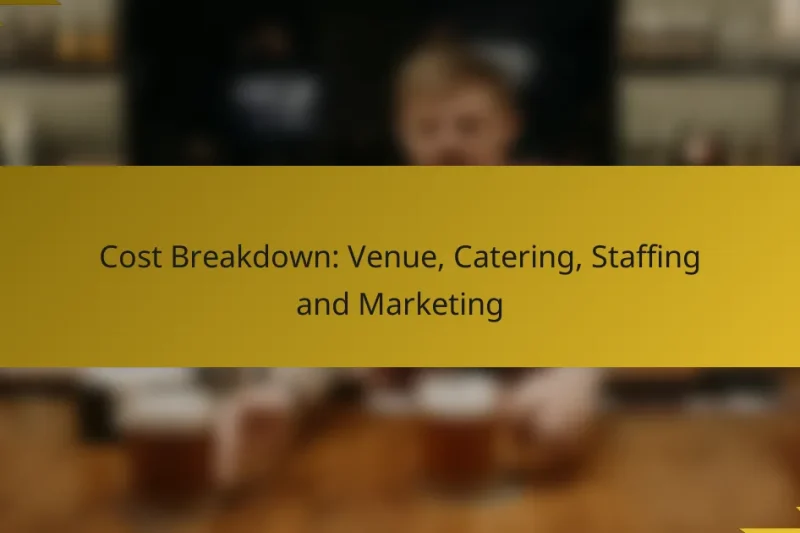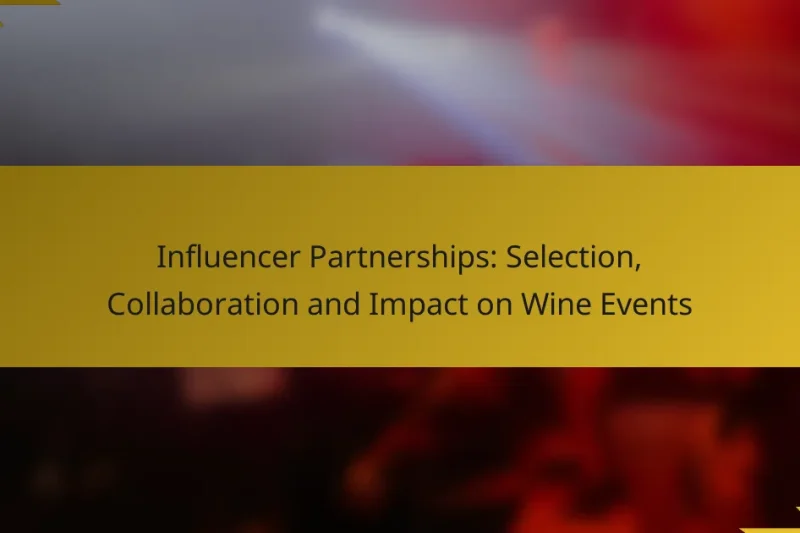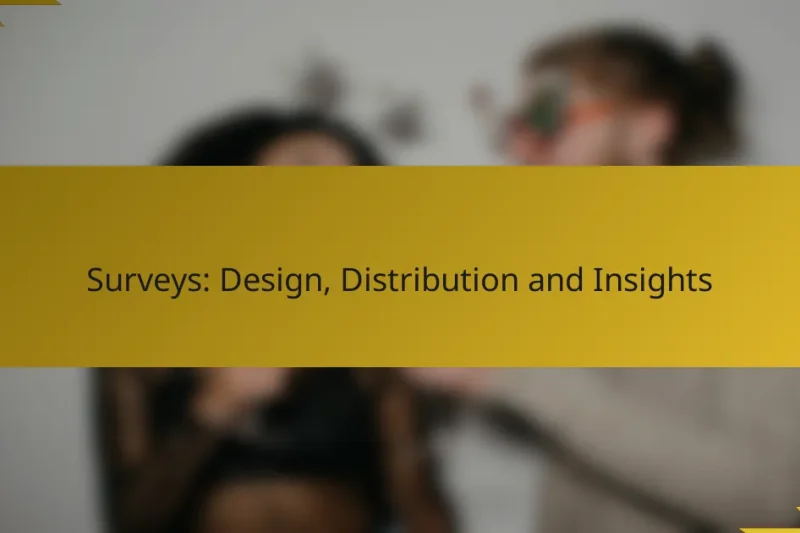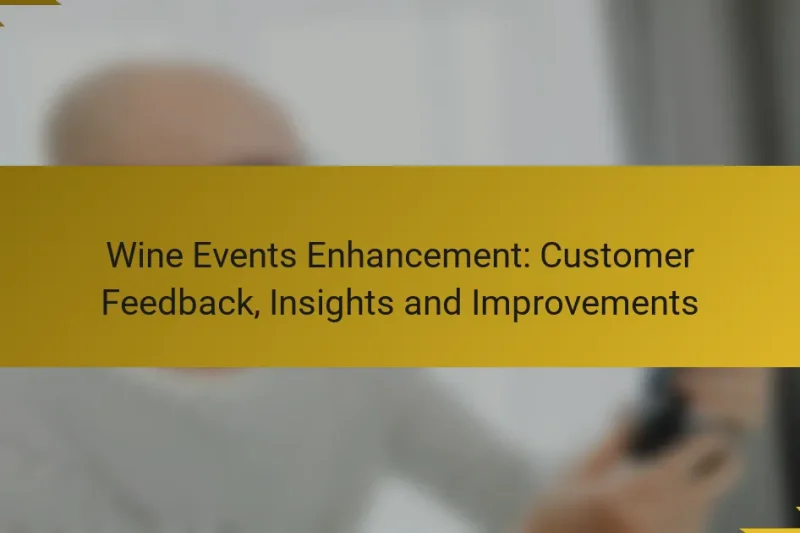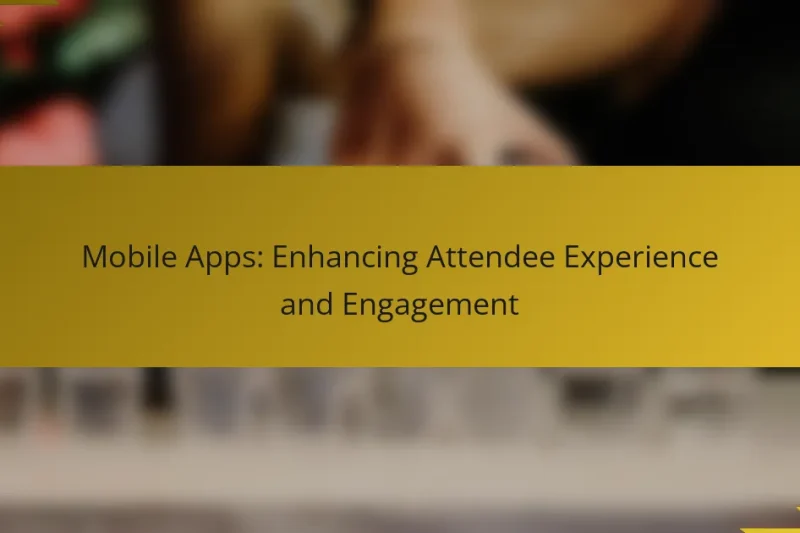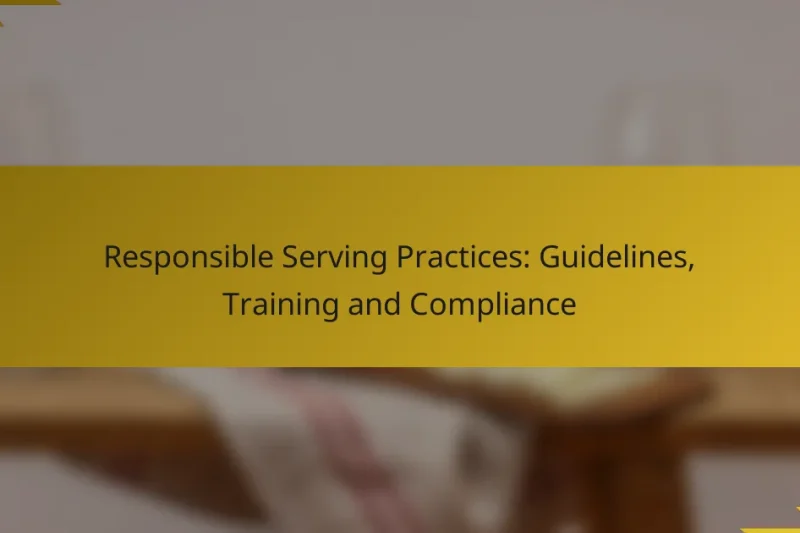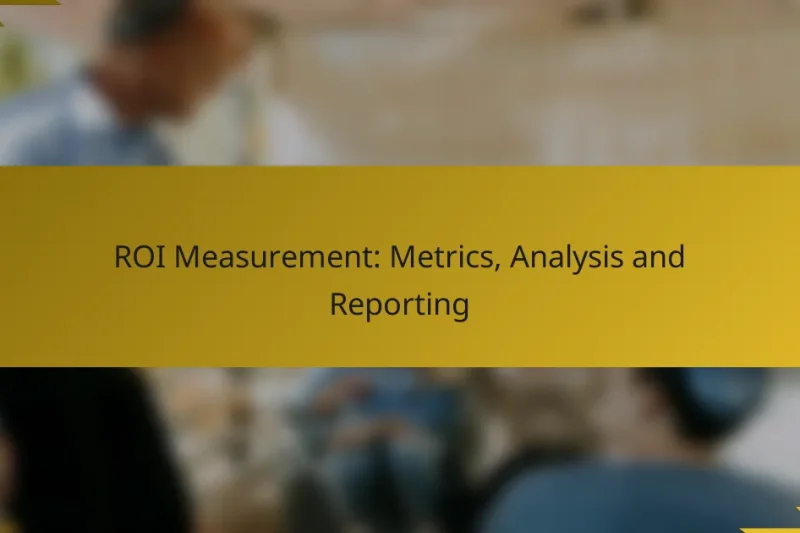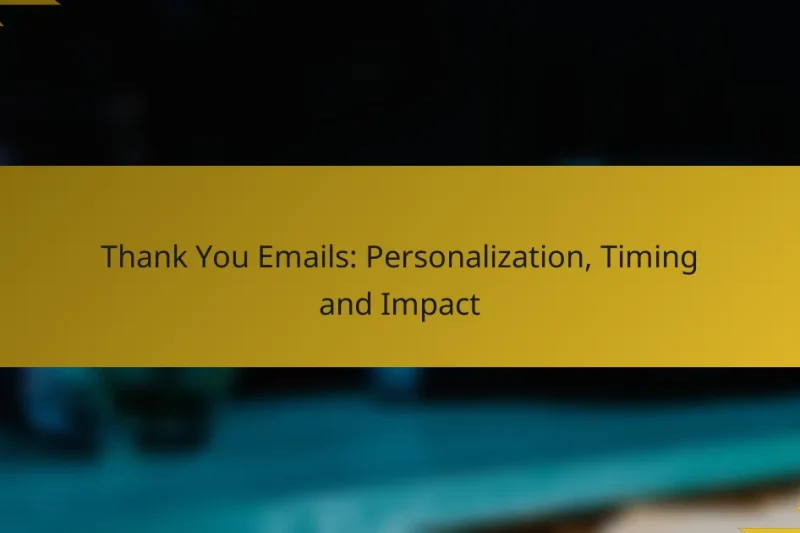Choosing the right event registration platform is crucial for effectively managing attendees and ensuring a smooth … Event Registration Platforms: Selection Criteria and Key FeaturesRead more
Effective event and tasting campaign management requires a blend of strategic planning, targeted outreach, and ongoing engagement with participants. By harnessing technology and data, organizers can elevate attendee experiences and boost attendance rates. Key strategies include creating unique tasting experiences and leveraging influencer partnerships, all supported by essential tools that streamline communication and feedback collection.
Wine Tasting Events: Target Audiences, Preferences and Engagement
Wine tasting events in California attract a variety of audiences, including wine enthusiasts, tourists, and corporate … Wine Tasting Events: Target Audiences, Preferences and EngagementRead more
Cost Breakdown: Venue, Catering, Staffing and Marketing
When planning an event, understanding the cost breakdown for venue, catering, staffing, and marketing is crucial … Cost Breakdown: Venue, Catering, Staffing and MarketingRead more
Influencer Partnerships: Selection, Collaboration and Impact on Wine Events
Influencer partnerships play a crucial role in the success of wine events by enhancing brand visibility … Influencer Partnerships: Selection, Collaboration and Impact on Wine EventsRead more
Surveys: Design, Distribution and Insights
Surveys are powerful tools for gathering insights, but their effectiveness hinges on thoughtful design, strategic distribution, … Surveys: Design, Distribution and InsightsRead more
Wine Events Enhancement: Customer Feedback, Insights and Improvements
Enhancing wine events in California relies heavily on customer feedback, which offers crucial insights into attendee … Wine Events Enhancement: Customer Feedback, Insights and ImprovementsRead more
Mobile Apps: Enhancing Attendee Experience and Engagement
Mobile apps are transforming the way attendees engage with events by offering interactive features that promote … Mobile Apps: Enhancing Attendee Experience and EngagementRead more
Responsible Serving Practices: Guidelines, Training and Compliance
Responsible serving practices are crucial for ensuring the safe and legal service of alcohol in various … Responsible Serving Practices: Guidelines, Training and ComplianceRead more
ROI Measurement: Metrics, Analysis and Reporting
ROI measurement is a critical process that assesses the financial return generated from investments in relation … ROI Measurement: Metrics, Analysis and ReportingRead more
Thank You Emails: Personalization, Timing and Impact
Thank you emails are a powerful tool for building relationships and expressing gratitude. By personalizing your … Thank You Emails: Personalization, Timing and ImpactRead more
How to manage event campaigns effectively?
Managing event campaigns effectively involves strategic planning, targeted outreach, and continuous engagement with attendees. By leveraging technology and data, you can enhance the overall experience and improve attendance rates.
Utilize event management software
Event management software streamlines the planning process by providing tools for registration, ticketing, and scheduling. Platforms like Eventbrite or Cvent can automate tasks, saving time and reducing errors.
When choosing software, consider features such as user-friendly interfaces, integration with marketing tools, and analytics capabilities. A good system can help you track attendee engagement and manage logistics efficiently.
Implement targeted marketing strategies
Targeted marketing strategies focus on reaching specific demographics that are most likely to attend your event. Use data analytics to identify your audience and tailor your messaging accordingly.
Consider using email campaigns, social media ads, and partnerships with influencers to boost visibility. Personalizing your outreach can significantly increase engagement rates and drive ticket sales.
Engage with attendees through social media
Social media is a powerful tool for engaging with attendees before, during, and after your event. Create dedicated event pages on platforms like Facebook and Instagram to share updates and build excitement.
Encourage attendees to share their experiences using event-specific hashtags. This not only fosters community but also increases your event's reach through user-generated content.
Analyze past event data for improvements
Analyzing data from previous events helps identify what worked well and what didn’t. Look at attendance numbers, feedback surveys, and engagement metrics to inform your future campaigns.
Establish key performance indicators (KPIs) to measure success, such as ticket sales growth or social media engagement. Use these insights to refine your strategies and enhance the overall attendee experience for future events.
What are the best tasting campaign strategies?
The best tasting campaign strategies focus on engaging potential customers through unique experiences and effective communication. Key approaches include leveraging influencer partnerships, offering exclusive tasting experiences, and utilizing email marketing for promotions.
Leverage influencer partnerships
Partnering with influencers can significantly enhance the reach and credibility of your tasting campaigns. Influencers often have dedicated followings that trust their recommendations, making them effective advocates for your brand.
When selecting influencers, consider their audience demographics and engagement rates. Aim for micro-influencers who may have smaller but highly engaged audiences, as they can often yield better conversion rates compared to larger influencers.
Offer exclusive tasting experiences
Exclusive tasting experiences create a sense of urgency and allure, encouraging customers to participate. These can include limited-time events, private tastings, or special access to new products before they hit the market.
To maximize impact, consider incorporating themed events or collaborations with local chefs or artisans. This not only enhances the experience but also fosters community engagement and brand loyalty.
Utilize email marketing for promotions
Email marketing remains a powerful tool for promoting tasting campaigns. By segmenting your audience, you can tailor messages that resonate with specific groups, increasing the likelihood of participation.
Include clear calls to action, enticing subject lines, and visually appealing content in your emails. Offering exclusive discounts or early access to events can further incentivize recipients to engage with your campaign.
What tools are essential for event and tasting management?
Essential tools for event and tasting management include platforms that streamline ticketing, communication, and feedback collection. Utilizing the right software can enhance attendee experience and improve event outcomes.
Eventbrite for ticketing
Eventbrite is a popular platform for managing ticket sales and registrations for events. It allows organizers to create custom event pages, set ticket prices, and track sales in real-time. Features like promotional codes and early bird pricing can help boost attendance.
When using Eventbrite, consider integrating it with social media to reach a broader audience. Additionally, ensure your event page is visually appealing and contains all necessary details to encourage ticket purchases.
Mailchimp for email campaigns
Mailchimp is an effective tool for managing email marketing campaigns related to events and tastings. It enables users to design professional-looking emails, segment audiences, and automate follow-ups. This can significantly enhance engagement and keep attendees informed.
To maximize Mailchimp's effectiveness, personalize your emails based on attendee preferences and past interactions. Regularly analyze campaign performance to refine your strategy and improve open and click-through rates.
SurveyMonkey for feedback collection
SurveyMonkey is a valuable resource for collecting feedback from attendees after an event or tasting. It allows organizers to create customized surveys to gauge satisfaction, gather suggestions, and identify areas for improvement. This data is crucial for planning future events.
When designing surveys, keep questions concise and focused to encourage higher response rates. Consider offering incentives, such as discounts on future events, to motivate attendees to complete the survey.
What are the key metrics for measuring campaign success?
Key metrics for measuring campaign success include attendee engagement rates, sales conversion rates, and social media reach and interactions. These metrics provide insights into how effectively a campaign is performing and where improvements can be made.
Attendee engagement rates
Attendee engagement rates reflect how actively participants are involved during an event or campaign. This can be measured through metrics such as session attendance, participation in activities, and feedback responses. High engagement rates often indicate that the content resonates with the audience.
To improve engagement, consider interactive elements like polls, Q&A sessions, or networking opportunities. Aim for engagement rates above 50% to ensure that your audience is not just present but actively participating.
Sales conversion rates
Sales conversion rates measure the percentage of attendees who make a purchase or take a desired action after the campaign. This metric is crucial for assessing the financial effectiveness of your event. A typical conversion rate for events can range from 5% to 20%, depending on the industry and audience.
To enhance conversion rates, follow up with attendees promptly after the event with targeted offers or personalized communications. Tracking these rates can help identify which aspects of your campaign are most effective in driving sales.
Social media reach and interactions
Social media reach and interactions gauge the extent to which your campaign is being discussed and shared online. This includes metrics such as likes, shares, comments, and overall impressions across platforms. A strong social media presence can amplify your campaign's visibility and attract new audiences.
To boost social media engagement, create shareable content and encourage attendees to post about their experiences. Aim for a consistent increase in reach and interactions, ideally targeting a growth rate of 10% to 30% per campaign.
What prerequisites are needed for successful campaigns?
Successful campaigns require well-defined objectives, a clear understanding of the target audience, and a realistic budget. These elements ensure that the campaign is focused, effective, and financially viable.
Define clear objectives
Clear objectives provide direction and measurable outcomes for your campaign. They should be specific, measurable, achievable, relevant, and time-bound (SMART). For example, instead of aiming to "increase sales," set a goal to "boost sales by 20% over the next quarter."
Establishing objectives helps in evaluating the campaign's success. Regularly review these goals to adjust strategies as necessary, ensuring they remain aligned with overall business aims.
Identify target audience
Identifying the target audience is crucial for tailoring your campaign effectively. Consider demographics such as age, gender, location, and interests to create a detailed profile of your ideal customer. This helps in crafting messages that resonate with them.
Utilize market research and customer feedback to refine your audience understanding. Engaging with your audience through surveys or social media can provide insights into their preferences and behaviors, enhancing campaign relevance.
Establish a budget
A well-planned budget is essential for managing resources throughout the campaign. Determine how much you can allocate to various aspects, such as marketing materials, venue costs, and promotional activities. A typical budget might range from a few hundred to several thousand dollars, depending on the campaign scale.
Keep track of expenses and adjust your budget as needed to avoid overspending. Consider setting aside a contingency fund for unexpected costs, ensuring that financial constraints do not hinder campaign success.
How to create a tasting event timeline?
Creating a tasting event timeline involves outlining key dates and tasks to ensure a successful event. This structured approach helps manage preparations efficiently and keeps all stakeholders informed.
Step 1: Set event date
Choosing the right date for your tasting event is crucial. Consider factors such as local holidays, weather conditions, and potential conflicts with other events in the area. Aim for a date that maximizes attendance, typically on weekends or during local festivals.
Once you have a target date, confirm it with all key participants, including vendors and venues, to avoid last-minute changes. A good practice is to set the date at least a few months in advance to allow ample time for promotion.
Step 2: Plan logistics
Logistics encompass all the practical details of your tasting event. Start by selecting a venue that fits your expected number of attendees and aligns with the event's theme. Ensure the space is accessible and equipped with necessary amenities like seating, restrooms, and catering facilities.
Next, create a checklist of essential logistics, including equipment rentals, catering options, and staffing needs. Consider using a table to track these elements, ensuring you cover all bases from setup to cleanup. Regularly review this list to stay organized and on schedule.
